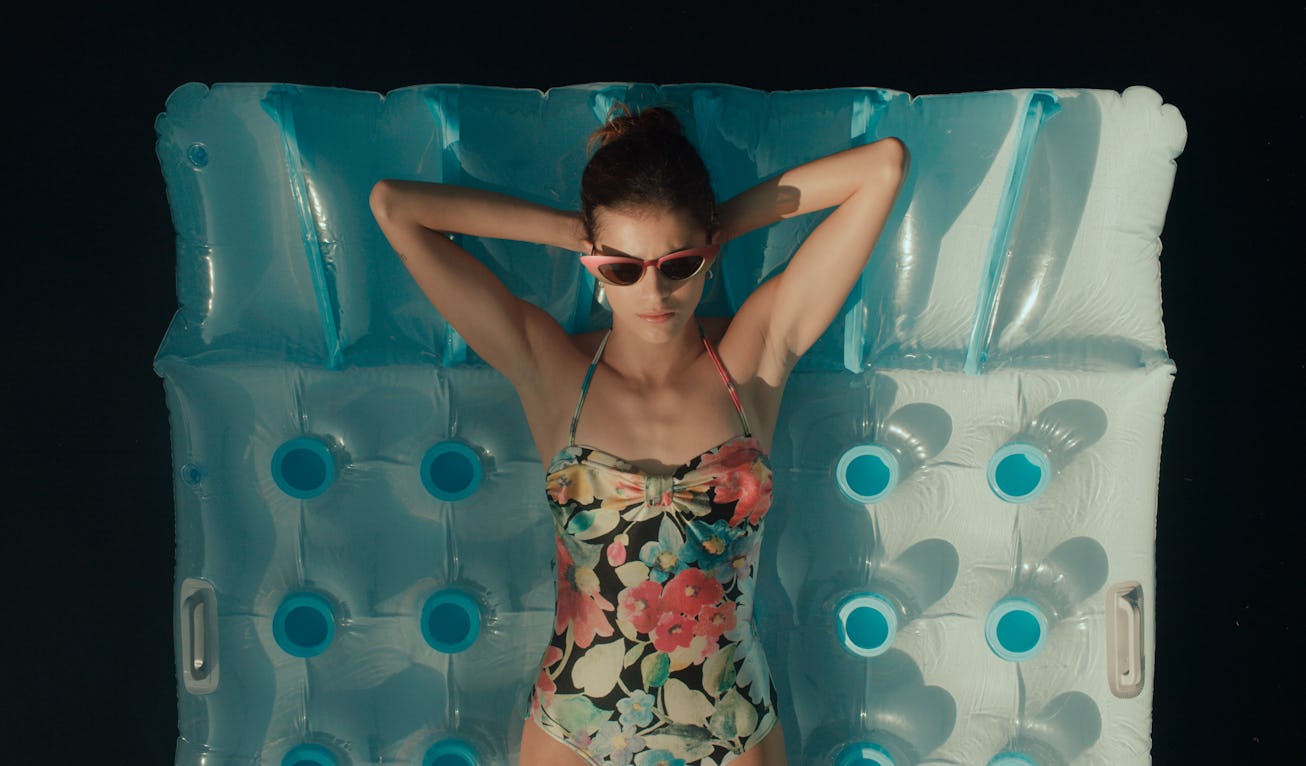
Culture
Amanda Is a Surreal, Charming Portrait of Loneliness
Benedetta Porcaroli’s performance traverses the grounds of a peculiar friendship that’s as sweet as it is tart.
In Amanda, the debut feature from Italian writer/director Carolina Cavalli, a 24-year-old girl wears the same outfit every day: a rainbow crochet vest over a schoolgirl uniform.
It’s an exquisite costume detail for Amanda, the titular character played by Benedetta Porcaroli, who formed the look by stealing different pieces from her nephew, mother, and sister. It’s one of the most compelling things about her character, a young woman of peculiar, mixed personalities — who is as intense, absurd, and off-putting as she is magnetic.
The film follows wealthy, beautiful, and impossibly lonely Amanda, whose upper-class family foots the bill for her lifestyle, which mostly involves lounging listlessly on a float in her pool and going to see movies alone. She longs for companionship, but can’t seem to meet anyone who isn’t repelled by her intensity. That is, until she remembers she had a childhood friend: Rebecca (Galatea Bellugi), who is now a similarly lonely agoraphobic shut-in. The two form an unlikely, at times volcanic friendship that catapults them out of their loneliness, even temporarily.
Porcaroli’s Amanda is deadpan and vulnerable, transforming the film from a story about a vaguely sad rich girl to a strange, surreal, and charming portrait of loneliness in contemporary Italy. At its best, the film is a portrait as sweet and tart as an unripe cherry of unlikely friendship between two complicated young women.
“They build a sense of faith between each other, and day by day they understand that it's not that hard: If we keep an eye on the person we have in front of us, it's easier to understand their pain,” Porcaroli tells NYLON. “I think she's very sweet in this sense. By the end of the film, she finds a way to love herself, and then she can love other people.”
NYLON caught up with Porcaroli to talk about how she made a wealthy, beautiful character so empathetic, as well as about loneliness and friendship.
Amanda is in theaters now.
How did you go about making Amanda empathetic?
We tried to understand the logic of this character, because she has a very straight logical point of view. Sometimes this can be misunderstood by the rest of the world. So we tried to find a way in which everybody could understand her, even if they don't act in the same way. We tried to make her empathic and not so naughty or spoiled just because she came from a very rich family.
Somebody can say, "What's the problem? You're rich, you're not doing anything from the morning to the night, so what's the problem?" She has a relationship problem, which is something very common during these years. It is getting worse now, but I feel like this generation has this problem relating to other people.
She tries to find someone who can love her, and this is the hardest battle for her — to not be afraid of being disappointed or cheated. Her loneliness is something that she doesn't want to give up. At the beginning of the film, she feels lonely, even if she has a family. She has a lot of people around her, but still she feels this sense of loneliness around her, and she doesn't know how to get out of this feeling. Through the friendship, she finds the light at one point.
Her character changes a lot, but the parts of her personality that make her really interesting and funny don’t change, which I appreciated.
That's the thing. Because she finds a way to tolerate other people, their problems, and to be a faithful friend and a good daughter and a good sister. Because at the beginning, she's alone – not only lonely, but she acts like she's alone in the world, and she's not. Through this friendship she understands how to calibrate everything and to understand other people. So, it's also beautiful, the relationship with the mother, for example, that they didn't have at all. And for the first time, she looks at her like, "Oh my gosh, she's a woman. She has her problems, she's suffering for something that I don't know." It's interesting because sometimes we are close-minded and focus on ourselves. I think it's important to be generous and to look outwards.
What are the things that you felt like you had in common with Amanda?
Well, the sense of humor is not that far. When I read the script, I thought, "Okay, I think I must do it because it's perfect." Me and Carolina, we share something. I don't know what exactly it is, but we became friends immediately. So something about the energy, also the humor, but there was something that I immediately caught about this character.
I wasn't like her when I was a teenager. I was the opposite in some way. I was full of friends. I love to be surrounded by people, so I don't have this problem that she had. But in some way, it's a film that even if you didn't have that kind of problem, you can understand. The dynamic is similar to a lot of situations that everybody for sure had lived before. Everybody, I think passed through the period that we feel like nobody can understand us.
This interview has been edited and condensed for clarity.
This article was originally published on